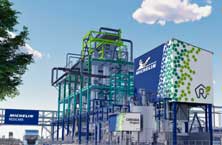Polymers firm Kraton has joined the CERISEA Project, an initiative led by French tyre maker Michelin and its subsidiary to establish a manufacturing facility that will accelerate the development of 5-HMF (5-Hydroxymethylfurfural). Derived from sugar chemistry, 5-HMF is a biobased molecule that provides a renewable alternative to fossil-based ingredients used across various industries, including tyres, coatings, adhesives, and surfactants.
This project marks the first industrial-scale production of 5-HMF in Europe, with the new French facility expected to produce 3,000 tonnes/year. Scheduled for completion in March 2029, the project has received US$20 million in funding from the European Union’s Horizon Europe Research & Innovation Program and the Circular Bio-based Europe Joint Undertaking.
As one of just 12 selected to participate, Kraton says it has been awarded a share of the grant to support the project’s R&D efforts focused on commercialising 5-HMF and converting it into high-performance, sustainable materials for new applications.
The collaboration, Kraton says, reflects its ongoing commitment to advancing circular and biobased innovation. As the inventor of styrenic block copolymers (SBC) and the world’s largest producer of pine chemicals, Kraton adds it has long-standing legacy of creating sustainable, high-performance products.
Its portfolio includes Revolution technology, Sylvatraxx, and Sylavacote for use in applications like adhesives, tyres, coatings, and road markings.
The project has 12 partners and two affiliated entities from five European countries. Besides Kraton and Michelin, other firms include Netherlands-based Avantium, and Arkema and ADM from France, along with four research centres from Germany, Spain and France.

